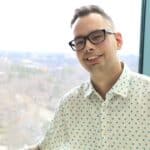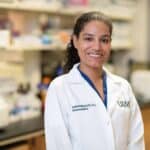By Katrina Dupins
Feb. 11, 2020 | Matthew Koshinski believes the car crash he was in two years ago saved his life. On the morning of Sept. 11, 2018, he wasn’t feeling his best. But the 22-year-old supervisor at UPS went in to work anyway.

Matthew Koshinski
“I didn’t think much of it. I just thought I’d push through it.”
He ended up leaving work after a few hours because he vomited twice. The next thing he remembers, he was in a hospital room.
“I was told I’d made it all the way to the airport and crashed into a pole,” he said. “I made a right instead of a left for some reason.”

Analiz Rodriguez, M.D., Ph.D. Photo by: Bryan Clifton
Koshinski arrived at UAMS as a trauma patient. He was initially evaluated using imaging that showed he may have had a stroke. But there was no bleeding. Health care professionals did an MRI to get a more detailed picture, which showed he had a brain tumor.
“We surmise he had a seizure and was unable to keep control of his car,” said Analiz Rodriguez, M.D, Ph.D., director of neurosurgical oncology at UAMS and a research scientist.
“That’s when I got involved in his care. It was an aggressive brain tumor the size of a small lime called an anaplastic astrocytoma .”
Rodriguez removed the tumor, which was located near some of the pathways responsible for vision. Koshinski had chemotherapy and radiation after his surgery and was also followed by neuro-ophthalmologist Joseph G. Chacko, M.D.
“This type of tumor is uncommon for someone in their 20s,” Rodriguez said. “We typically we see tumors like this with someone in their 60s.”
Koshinski’s maternal grandmother died from a glioblastoma three weeks after her diagnosis and six weeks before he was born. His mother, JoAnn Putt, said when she found out about her son’s diagnosis, her first thought was that it was genetic and thought about her other children. Rodriguez put those fears to rest.
As a researcher, Rodriguez analyzes her patients’ tumors after she removes them. Genetic sequencing showed it didn’t have a genetic component.
“Taking care of people like Matthew really inspires us to try to understand how we can develop more therapies for cancer,” Rodriguez said. “He and other patients are extremely brave. And they’re not only thinking about themselves, but they’re helping by their willingness to participate in our research efforts.”
Koshinski has been in remission since December.
“It was scary, but he survived and I’m very proud of him,” Putt said.
“I’m more appreciative of little things and more likely to look for the positive in everything,” Koshinski said. “You never know when you’re on your last day. If I didn’t have that car crash, my tumor would’ve continued to grow and I could’ve died from it.”
